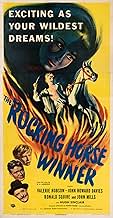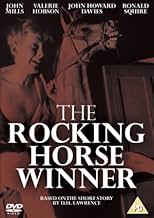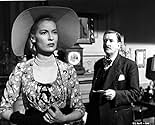AVALIAÇÃO DA IMDb
7,2/10
1,5 mil
SUA AVALIAÇÃO
Adicionar um enredo no seu idiomaA young boy receives a rocking horse for Christmas and soon learns that he is able to pick the winning horse at the races.A young boy receives a rocking horse for Christmas and soon learns that he is able to pick the winning horse at the races.A young boy receives a rocking horse for Christmas and soon learns that he is able to pick the winning horse at the races.
- Direção
- Roteiristas
- Artistas
Anthony Holles
- Bowler Hat
- (não creditado)
Melanie Mackenzie
- Matilda Grahame
- (não creditado)
Michael Ripper
- 2nd Chauffeur
- (não creditado)
Johnnie Schofield
- 1st Chauffeur
- (não creditado)
Caroline Steer
- Joan Grahame
- (não creditado)
- Direção
- Roteiristas
- Elenco e equipe completos
- Produção, bilheteria e muito mais no IMDbPro
Avaliações em destaque
The Rocking Horse Winner is directed by Anthony Pelissier, who also adapts the screenplay from the D. H. Lawrence short story of the same name. It stars Valerie Hobson, John Howard Davies, Ronald Squire, John Mills, Hugh Sinclair and Susan Richards. Music is by William Alwyn and cinematography by Desmond Dickinson.
Dreadful, Evil Money.
There's a handful of British films from the 1940s that deserve to be far better known, films that blended haunted themes with film noir traits and visual smarts. The Night Has Eyes, Uncle Silas, Corridor Of Mirrors and the magnificent Queen Of Spades readily come to mind. Now it has an official DVD release, we can add Anthony Pelissier's brilliant The Rocking Horse Winner to the obscure gem list.
Story has young Paul Grahame (Davies) receiving a weird looking Rocking Horse for Christmas. He's an introverted and sensitive lad, seemingly reaching out for some sort of guidance from his parents. Unfortunately his mother, Hester (Hobson), is a spendthrift badly hung up on money as some sort of status symbol, while his father, Richard (Sinclair), is a gambler, and not a good one at that. With Uncle Oscar Creswell (Squire) bailing them out of financial trouble for the last time, the Grahame family are heading for bankruptcy unless income can be found. Befriending the new handyman, Bassett (Mills), Paul is delighted to find that Bassett is an ex-jockey and regales him with tails of horse racing, he even learns from Bassett how to ride his Rocking Horse like a real jockey. Then something magical happens, Paul seems to be able to predict the winners of real horse races, and the money starts to roll in
D. H. Lawrence's story gets a faithful adaptation and transfers quite excellently to the screen. It's a haunting fantasy at heart, but one tinged with utter sadness, and being Lawrence it has a sex metaphor sitting right in the middle of the greed and exploitation thematics. As story progresses, it soon becomes evident that Paul has to ride his Rocking Horse to a frenzied climax, if he doesn't get there then he will not see the name of the next race winner. Initially he is thrilled to be able to win lots of money, the house seems to be telling him that his parents must have more money, so aided by Bassett, he is saving the cash to help his frantic mother, who by now has resorted to pawning possessions for cash. But the more he wins, and the more Bassett and Uncle Oscar also profit, the further away from his parents Paul gets. Soon enough it's going to come to a head and it will prove to be devastating for the Grahame family.
Pelissier, Alwyn and Dickinson each work respective wonders to smoother the picture with a sense of the unearthly, not so much supernatural, but like a blurry discord, a purgatory where ignorant parenting dwells and childhood innocence is corrupted. Pic is crammed with sinister imagery. The Rocking Horse itself is up in the attic, which gives the makers perfect opportunities for shadows to enhance the "unhealthy" scenes of Paul riding away like a boy possessed, while for the key scene Pelissier uses a depth perception technique that is gloriously disorientating. An ascent by Paul up to the attic is moody magnificence, Hester's visit to the back room Pawnbroker (Charles Goldner) drips with unease, while the finale features a near demonic last shot that literally will be burned into your soul.
With top performances from the cast to seal the deal, this tale of a boy and his Rocking Horse gnaws away at the senses as the fallibility of the human condition is frighteningly laid bare. 9/10
Dreadful, Evil Money.
There's a handful of British films from the 1940s that deserve to be far better known, films that blended haunted themes with film noir traits and visual smarts. The Night Has Eyes, Uncle Silas, Corridor Of Mirrors and the magnificent Queen Of Spades readily come to mind. Now it has an official DVD release, we can add Anthony Pelissier's brilliant The Rocking Horse Winner to the obscure gem list.
Story has young Paul Grahame (Davies) receiving a weird looking Rocking Horse for Christmas. He's an introverted and sensitive lad, seemingly reaching out for some sort of guidance from his parents. Unfortunately his mother, Hester (Hobson), is a spendthrift badly hung up on money as some sort of status symbol, while his father, Richard (Sinclair), is a gambler, and not a good one at that. With Uncle Oscar Creswell (Squire) bailing them out of financial trouble for the last time, the Grahame family are heading for bankruptcy unless income can be found. Befriending the new handyman, Bassett (Mills), Paul is delighted to find that Bassett is an ex-jockey and regales him with tails of horse racing, he even learns from Bassett how to ride his Rocking Horse like a real jockey. Then something magical happens, Paul seems to be able to predict the winners of real horse races, and the money starts to roll in
D. H. Lawrence's story gets a faithful adaptation and transfers quite excellently to the screen. It's a haunting fantasy at heart, but one tinged with utter sadness, and being Lawrence it has a sex metaphor sitting right in the middle of the greed and exploitation thematics. As story progresses, it soon becomes evident that Paul has to ride his Rocking Horse to a frenzied climax, if he doesn't get there then he will not see the name of the next race winner. Initially he is thrilled to be able to win lots of money, the house seems to be telling him that his parents must have more money, so aided by Bassett, he is saving the cash to help his frantic mother, who by now has resorted to pawning possessions for cash. But the more he wins, and the more Bassett and Uncle Oscar also profit, the further away from his parents Paul gets. Soon enough it's going to come to a head and it will prove to be devastating for the Grahame family.
Pelissier, Alwyn and Dickinson each work respective wonders to smoother the picture with a sense of the unearthly, not so much supernatural, but like a blurry discord, a purgatory where ignorant parenting dwells and childhood innocence is corrupted. Pic is crammed with sinister imagery. The Rocking Horse itself is up in the attic, which gives the makers perfect opportunities for shadows to enhance the "unhealthy" scenes of Paul riding away like a boy possessed, while for the key scene Pelissier uses a depth perception technique that is gloriously disorientating. An ascent by Paul up to the attic is moody magnificence, Hester's visit to the back room Pawnbroker (Charles Goldner) drips with unease, while the finale features a near demonic last shot that literally will be burned into your soul.
With top performances from the cast to seal the deal, this tale of a boy and his Rocking Horse gnaws away at the senses as the fallibility of the human condition is frighteningly laid bare. 9/10
One day, a fine young lad, played by John Howard Davies, gets a wooden rocking horse for a Christmas gift by his favorite uncle, a rich uncle. His father is a butterfingers with money, as he bets and loses it, while his wife, played by Valerie Hobson, is constantly at him, saying they need more money, we simply must have it. She, by the way, is used to having her way and used to living beyond their means. The uncle is her brother who has gotten them out of more than one financial scrape, who now refuses to do it anymore. He's done. The boy discovers by getting on the horse and rocking, that the horse not only talks to him, but gives him tips on the winners at the horse track. By way of betting through the groundskeeper, played by John Mills, the young boy amasses gads of money. And yet, what starts as a fantasy and a somewhat whimsical little film takes a dramatic and scary turn. This film has a little bit of everything for everyone: fantasy, humor, drama, and even a bit of the Gothic touch. The lesson to be learned from this film is simple: do not argue, or discuss money issues, in front of your children. One feels that maybe writer D. H. Lawrence, who wrote the short story from which this was based, may have lived a similar type of childhood but to a degree obviously. If it's draining for an adult, how do you think it makes children feel? This climax is made for a point for all adults - to learn from and change. A very dramatic and memorable film is "The Rocking Horse Winner." All the actors were exceptional, including the young lad, but the real star of the story is author D. H. Lawrence's imagination that tries to teach people the only way he can.
Suspenseful, intriguing, disturbing, heartbreaking, atmospherically crafted by director and photographer, this is a gem of a movie that was too out of the rut to be appreciated by audiences in its day. The characters are not only totally believable but so convincingly acted that few viewers will have any difficulty accepting the plot's key supernatural premise. Because they are so credibly realistic, however, some of the people in this movie (the lad's mother and father, for instance) are far from sympathetic. This trait doubtless alienated contemporary audiences even further, particularly those looking for escape into an idealistic world of smilingly duty-bound, hardworking mothers and bumbling yet well-intentioned dads.
As stated, all the players are excellentincluding producer John Mills who cast himself in a small but key rolebut three are so outstanding it would churlish not to mention them individually: Valerie Hobson is perfect as the selfish, socially aspiring mum; John Howard Davies is likewise brilliant as the driven, psychotic boy of the title; and it's great to see Ronald Squire utilizing his talents to the full in a major role.
The pace never slackens and the movie incorporates so many unforgettably powerful scenes, it would be impossible to single just three or four for special praise.
In short: a masterpiece from screenwriter/director Anthony Pelissier (who handled only a handful of movies), photographer Desmond Dickinson and a fine array of artists and craftspeople under the control of actor/producer John Mills.
As stated, all the players are excellentincluding producer John Mills who cast himself in a small but key rolebut three are so outstanding it would churlish not to mention them individually: Valerie Hobson is perfect as the selfish, socially aspiring mum; John Howard Davies is likewise brilliant as the driven, psychotic boy of the title; and it's great to see Ronald Squire utilizing his talents to the full in a major role.
The pace never slackens and the movie incorporates so many unforgettably powerful scenes, it would be impossible to single just three or four for special praise.
In short: a masterpiece from screenwriter/director Anthony Pelissier (who handled only a handful of movies), photographer Desmond Dickinson and a fine array of artists and craftspeople under the control of actor/producer John Mills.
The dialogue is expectedly very British and good. Though a perfunctory performance was all the needlessly limited role of the father required, all other players did wonderfully.
Interestingly, the story concerns a good, but sybaritic mother's avarice and her loving son's obsessive desire to satisfy it. It also plays into the idea of money as an inherent evil while earning my high praise by not taking this too far. It is also another one of many films I have enjoyed on the fascinating subject of gambling.
Interestingly, the story concerns a good, but sybaritic mother's avarice and her loving son's obsessive desire to satisfy it. It also plays into the idea of money as an inherent evil while earning my high praise by not taking this too far. It is also another one of many films I have enjoyed on the fascinating subject of gambling.
I first saw this film as a pare-teen many years ago and it stuck in my memory all these years; I suppose I identified, at the time, with the idea that events could be somehow manipulated and controlled by sheer intensity. When I recently saw this film on DVD, it still struck a nerve and, as an adult, realized what a strong film it is and why it had been in my memory all these years. Because the file is so old, many of the mannerisms in the movie appear quaint now, but the themes are timeless; sensitive kids sensing parental dysfunction and taking it upon themselves to try and "fix" things. It's interesting to note that John Mills, then a staple in English films, produced the film. I would recommend this film to anyone with a penchant for psychological drama of the old school.
Você sabia?
- CuriosidadesBassett says that he had "... fine plans for teaching Gordon Richards a thing or two...". Gordon Richards (1904 - 1986) was an English jockey. He was the Champion Jockey in British flat horse-racing 26 times, a record that still stands.
- Citações
[last lines]
Hester Grahame: I wanted to see the end of it, just wanted to be sure it had gone. Gone for good.
Bassett: You won't never see the end of it, ma'am, nor will I. As long as ever we'll live, we'll remember, and we'll know just what it is was done.
- Trilhas sonorasSilent Night
(uncredited)
Music by Franz Xaver Gruber
English lyrics by John Freeman Young
Sung by the carollers
Principais escolhas
Faça login para avaliar e ver a lista de recomendações personalizadas
Detalhes
- Data de lançamento
- País de origem
- Idioma
- Também conhecido como
- The Rocking Horse Winner
- Locações de filme
- Denham Studios, Denham, Buckinghamshire, Inglaterra, Reino Unido(studio: made at Denham Studios, London, England)
- Empresas de produção
- Consulte mais créditos da empresa na IMDbPro
- Tempo de duração
- 1 h 31 min(91 min)
- Cor
- Proporção
- 1.37 : 1
Contribua para esta página
Sugerir uma alteração ou adicionar conteúdo ausente



























